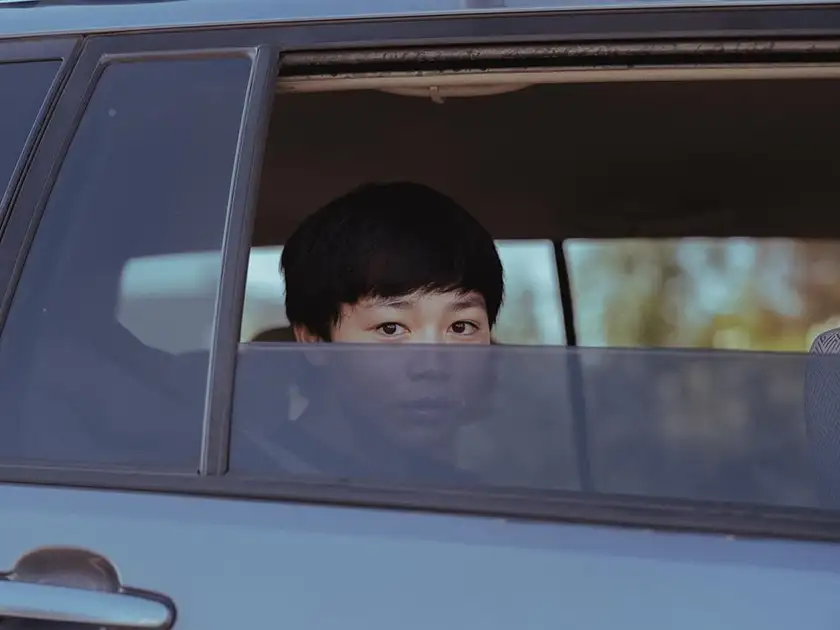In his feature debut Dìdi, Academy Award nominated filmmaker Sean Wang tackles the immigrant experience and coming of age in California in the 2000s.
Director: Sean Wang
Genre: Drama
Run Time: 93′
US Release: July 26, 2024 (NY/LA), August 16, 2024 (nationwide)
UK Release: August 2, 2024
Where to watch: in US theaters & UK cinemas
Dìdi (弟弟) is the feature debut from Academy Award-nominated short film director Sean Wang. It won the US Dramatic Award at Sundance and is now being screened at SXSW. Reportedly semi-autobiographical and littered with the specificity that makes you believe it, Dìdi is a coming-of-age story heavily tied to the immigrant experience. Our protagonist, and the lens through which we view the film, is Chris (Izaac Wang), or Wang Wang, depending on where in the story you look.
He’s a stereotypical 13-year-old in that he’s trying to figure out the type of person he wants to be while awash in a sea of hormones and hardcoded, burgeoning teenage desire to rebel. What isn’t typical is that he is dealing with all of this while balancing the fact that he is a first-generation child of Taiwanese immigrants. It’s a lot to handle for anyone.
Chris lives in Fremont, California, and the story is sprinkled with all sorts of Southern California specificity that, if you grew up in that area, will have you doing a double take. We first meet him in the summer before high school as he’s blowing up mailboxes – and possibly an already dead squirrel. His friends group isn’t the best, but it’s awash with the posturing masculinity and the seeds of toxicity that only 13-year-old boys could pull off. They’re adolescents play acting at being men. Again, if you grew up during that time period, the amount of “Hellas’ are accurate but enough to make your eye twitch and have Paramore running in the background of your brain.
As a character, there are moments where Chris is thoroughly unsympathetic, especially with how he relates to his mom and his sister while he’s in the midst of his journey toward growth. Chris is butting heads with them because of that shared immigrant experience: he just wants to fit in and is taking it out on the family he’s closest with. Izaac Wang brings this struggle to life with a maturity way beyond his young age.

Although Chris’s journey has a lot to do with coming to terms with who he is and where his place is in the world, it’s impossible to do that without intersecting with his family – his mom and sister. In some ways, they are the center around which his story orbits, and in relation to which the story is told. Shirley and Joan bear the brunt of his teenage gnarliness – his older sister, at one gross point, is the victim of a disgusting and immature but very teenage boy act of revenge.
Wang’s mom is perhaps the most interesting character in the film – and again, that might be colored by this reviewer’s own moment in life. Like Wang, she is on a journey too. We see glimpses of what might have been for her and feel the weight of dreams that have been crushed for practicality. Where the teenage Wang’s story feels open to the possibility, her story is more restrained by life.
In a performance by Joan Chen that is completely and heartbreakingly vulnerable, Chungsing Wang just wants her children to be okay. She’s distraught about them to the point of becoming overbearing at times. Her kids accuse her of nagging; she says she’s caring. Her daughter Vivian is about to go to college, and Chungsing just can’t handle it.
Everyone is cruel to her, especially her live-in mother-in-law and the younger Chris. Her husband is absent, and it’s a point of attack for her family against her. Joan Chen’s performance telegraphs the struggling mother’s pain and all the conflicts in her life achingly well. Despite all of this and all of the things she carries weighing heavily on her soul, her story is not unhopeful. Though Chungsing is not the focus of Dìdi, her story calls to mind the recent film Shayda, where another mom is just trying to do her best for her kid.
Dìdi shines because of these complex characters and their believable world. It is not a blockbuster story, but a smaller human drama littered with small moments and decisions that promise the audience that, although the character’s lives are imperfect and messy (like those of us watching), it’s going to be OK in the end.
On a broader note, the film makes it clear that we are in a season of filmmakers to which the earlier Wild West days of social media (circa 2008) on the internet—AIM, MySpace, extremely early YouTube, and beyond—were formative. (Maybe there is a case for the next Jazmin Jones documentary.) Something about this film adds up to present a very satisfying nostalgic aesthetic.
Overall, Dìdi is a great film. It’s a simultaneously painful, powerful, and poignant coming-of-age story filtered through the lens of the immigrant experience at the end of the hyper specific cultural moment in time that was the end of the first decade of the 2000s. Compelling performances by Izaac Wang, Shirley Chen, and Joan Chen really elevate this flick from a flip-phone-washed skateboard trip down memory lane to a story about identity.
Dìdi (弟弟) was screened at SXSW on March 12-13, 2024. The film was released in LA/NY Theaters on July 26, nationwide in the US on August 16, and in UK cinemas on August 2, 2024. Read our SXSW reviews!

